
The authors discuss the assessment and treatment of pediatric ADHD within the framework of the cultural psychotherapeutic model.

The authors discuss the assessment and treatment of pediatric ADHD within the framework of the cultural psychotherapeutic model.

What impact do atypical antipsychotic agents have on the persistence of stimulant therapy in ADHD? Researchers sought to find the answer in a group of 40,000 children and adolescents.
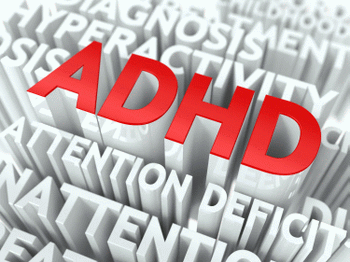
The rate of co-occurrence of ADHD and OCD has been reported to be as high as 60%. A question persists, however, on whether ADHD-OCD comorbidity is a true entity or whether symptoms attributed to one may be facets of a phenotype of the other.
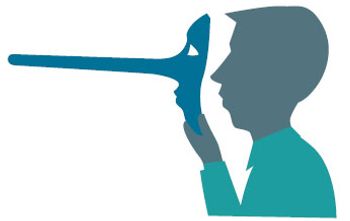
The most common pesticide for residential use and increasingly used in agriculture may be encouraging expression of an ADHD phenotype.
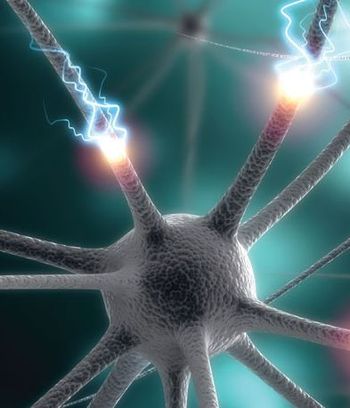
Studies examining the impact of ADHD drugs on dopamine transport have been inconclusive, and preclinical research suggests that emotional factors play a greater role than stimulant therapy in fostering addictive behaviors.

Rates of severe mental illness in children and adolescents have dropped 16% since 1996, according to a new study. The lead author explains possible reasons for this surprising finding and concludes: "We're moving in the right direction!"

New national cohort prospective study finds increased, though rare, cardiovascular risks associated with stimulant use in children and adolescents with ADHD. Is your patient at risk?

What forces influence your decision to treat ADHD? Case vignettes and a back-to-basics approach may bring clarity to the diagnostic and therapeutic clinical processes that surround the decision.
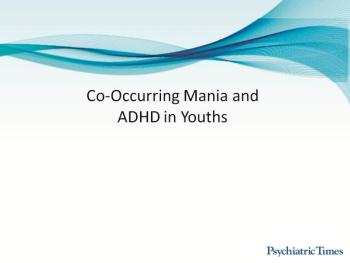
Evidence suggests that co-occurrence with ADHD is a marker of preadolescent-onset mania. This slideshow provides some evidence for you to decide whether this form of very early-onset mania represents a developmental subtype of the disorder.

What factors are involved in parents’ decision to begin medication treatment for a child with ADHD? An overview of studies that provide clinically relevant information related to the course and treatment outcomes of ADHD in children and adolescents.
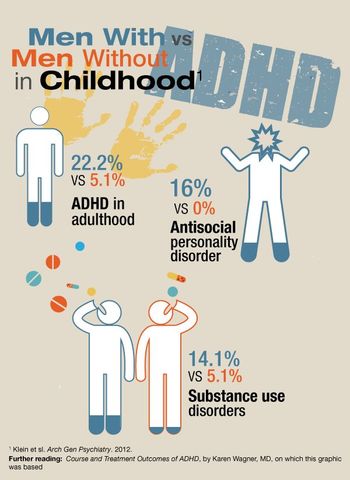
The results of the study featured in this infographic showed that compared with men without childhood ADHD, men with childhood ADHD had higher rates of ongoing issues in adulthood.

The relationship between bipolar disorder and ADHD remains unclear; however, this combined condition may represent an important genetic and clinical subtype with distinct psychopathology, familiality, and treatment response.

ADHD is on the rise according to a new report from the CDC, and most youngsters with the diagnosis are receiving treatment for the disorder. But the report raises a number of clinical implications . . .

This child's behaviors suggested ADHD-combined or primarily hyperactive type and conduct disorder. However, there was a strong history of trauma and affective disturbance. A structured interview format indicated that he formally met criteria for both PTSD and mixed episode. Without this format, features defining these disorders might have been missed and the child treated only for ADHD.

A newly published qualitative literature review found stimulants may provide neuroprotective effects for children with ADHD.

When the diagnosis of ADHD is clear, treatment can be successful, and education and supportive psychotherapy helpful. However, complications are common.

In this article, Julie Sherman, PhD and Jay Tarnow, MD briefly discuss the latest research findings on ADHD.

Some criminal activity can be eliminated by pharmacotherapy for ADHD. Should this information influence clinical practice? The short answer is an unequivocal “yes.”

It is important for mental health professionals to be familiar with research findings about widely used complementary and alternative medicine (CAM) treatments of ADHD in order to provide patients with accurate information on efficacy, safety, and appropriate use. Presented here are some of the results from several pivotal studies.

The aggregation of psychiatric diagnoses in individual psychiatric patients, ie, the presence of multiple disorders in one individual, is a curious and sometimes disturbing observation in psychiatry.

Parents of children with ADHD frequently ask whether there are nonmedication treatments that are effective for managing their children’s symptoms of ADHD. A recent meta-analysis provides an answer to this clinically important question.

Traumatic brain injury, criminal responsibility, traumatic stress, and autism spectrum/neurodevelopmental disorders slideshow

This mobile-friendly Vanderbilt ADHD Rating Scale follows closely the criteria set forth in DSM-IV and has been customized to make smartphone observations in the office and treatment environments.

The 3% to 5% of kids who are particularly gifted are also at special risk for being tagged with an inappropriate diagnosis of mental disorder. Caution is necessary when diagnosing.

Concerns are raised about DSM-5 revisions in the definition of depression. Many worry that eliminating the bereavement exception in the guidelines for the diagnosis of major depressive disorder represents a dangerous move.